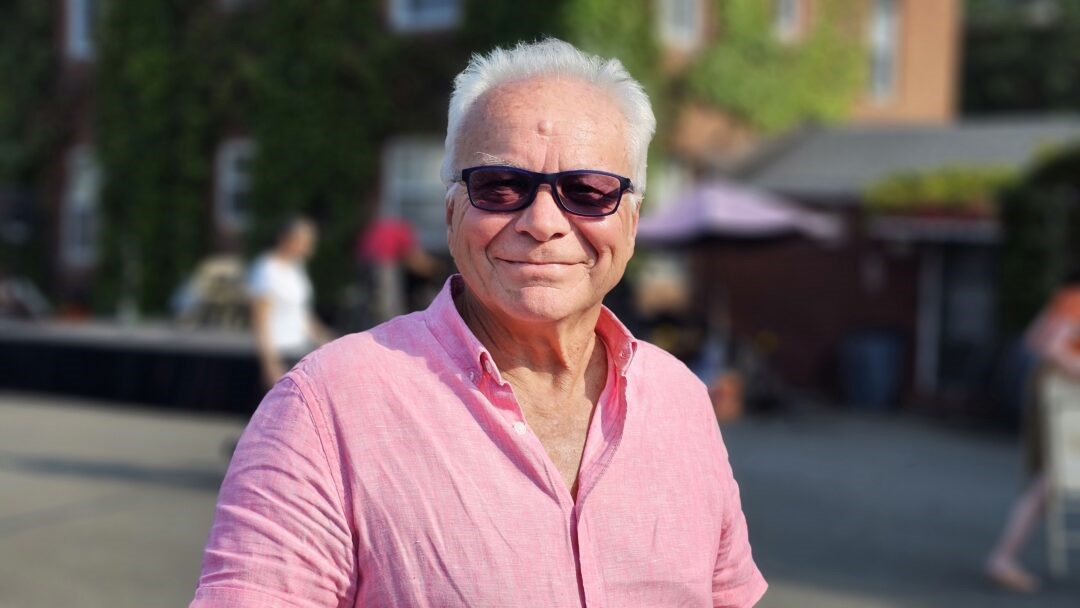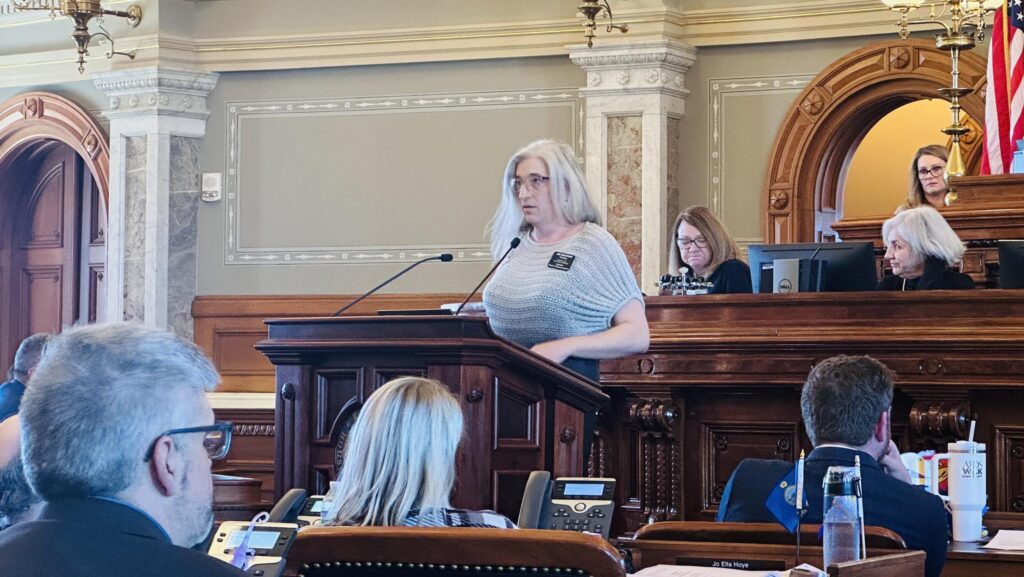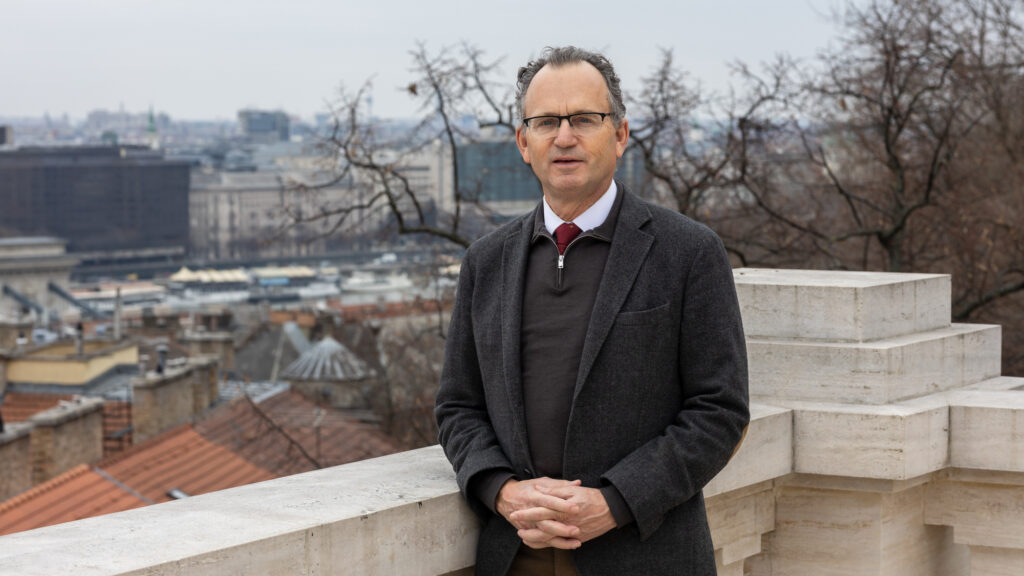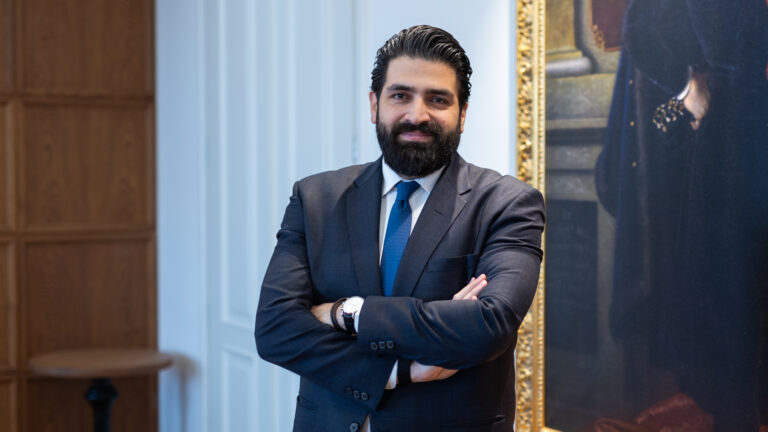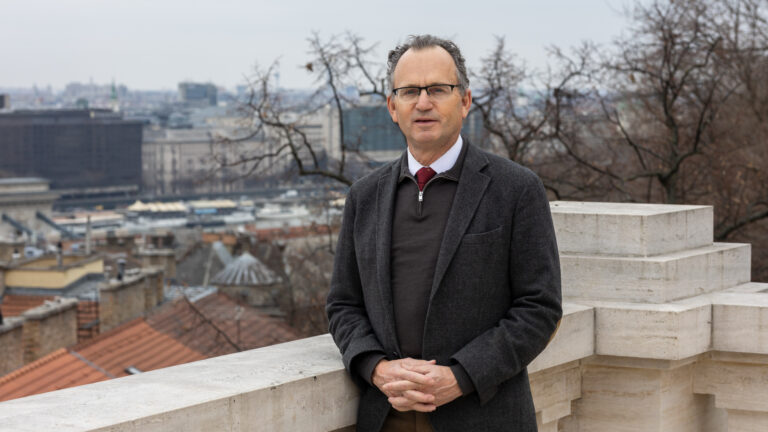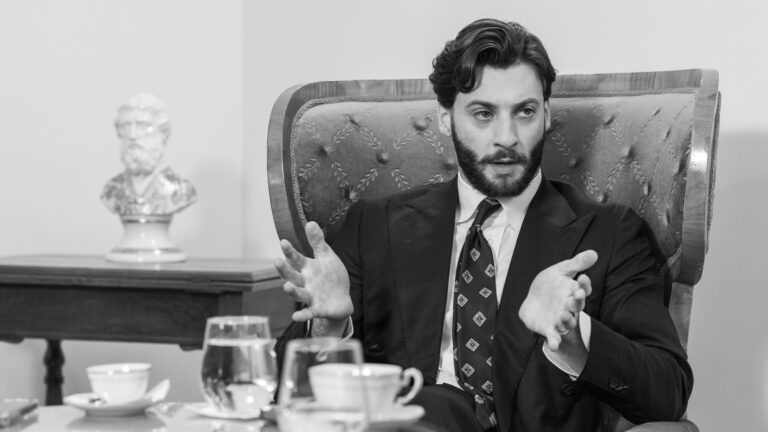This is an abridged version of the original interview published on 777blog on 3 September 2023.
Keresztes Béla and Erzsébet spent ten years journeying from Transylvania (then part of Hungary, now of Romania) to America. Along the way, their first two children were born, followed by two more in Germany, and an additional four in the US. Their sixth child, Ferenc, known to everyone as Feri, inherited his parents’ love of freedom, zest for life, perseverance, and deep faith. For 50 years, he played the organ at St. Stephen’s Church in Passaic, New Jersey, and for decades, he was a member of the church’s secular council, serving multiple times as its president.
***
Your parents became a large family along their long way to America…
My father was born in Kászon (Cașin, Transylvania), and my mother in Brassó (Brașov, Transylvania). They began their married life in Hungary and spent ten years migrating before finally arriving in America. My mother fled first; my father only followed at the end of the war. When they left, Erzsi and Magdi were already born; Béla and Józsi were born in Germany; and my mother was pregnant with their fifth child when they arrived in America, where Irén, I, Jutka, and Laci were born.
Initially, the plan was to settle in Nebraska, where they had a sponsor who wanted to take them to a farm; however, my mother refused to go there. When they arrived on a ship at Ellis Island, near New York City, their sponsor was paging my father over the loudspeakers, but he mispronounced his name, so my father didn’t recognize it and didn’t respond. But then my father heard someone say his name clearly in Hungarian. It was Béla Hilbert from Passaic, New Jersey, who immediately placed them in a hotel and the next day brought them to Passaic. St. Stephen’s R.C. Magyar Church had an active program to ensure Hungarian families stayed together instead of dispersing into non-Hungarian areas of the US. Father János Gáspár led this effort, bringing many Hungarian immigrants to Passaic. The Bodnár, Pál, and Jámbor families arrived the same way. They had all met in German refugee camps, where they restarted Hungarian scouting, then relocated to America and founded the Hungarian Scout Association in Exteris (KMCSSZ).
How did your family start a new life in Passaic?
We were given one room in a building next to the church, but only for a couple of weeks while Father Gáspár helped my father find work. My father was an electrician in Hungary, working for the military. When he arrived in America, he didn’t speak any English, but he took every opportunity to look for work and took any local job he could find. At first, he worked as a stoker at the Young Men’s Christian Association (YMCA). One day, in his search for work, he walked from Passaic to Rutherford into a neon light factory and spoke broken English to the owner, when the owner suddenly asked: ‘Why don’t you just speak Hungarian?’ As the factory had a union, my father couldn’t work there, but the owner gave him odd jobs around his house, and when my father got his work papers, he hired him at the factory. He worked there until he learned better English, passed the electrician’s exam, and started his own business, employing five or six workers.
Your parents showed incredible perseverance…
My grandfather told my father when he was 18: ‘Son, now go out and face life.’ My father later wrote a book about his adventurous life. He describes that when my mother fled, she was put on a train with two of our siblings just as the war was ending. My father received a message saying she’d be on a specific train. Later, he received another message saying that the train she was on had been bombed. But that wasn’t true. My sister Magdi had fallen ill, so my mother missed the train—that’s how they survived. His book also tells how my parents eventually found each other again and stayed together forever. In the refugee camps, Hungarians—especially scouts—stuck together. These families helped each other in the camps and later in America. The same Hungarian families who built scouting in the refugee camps later became the core of the Passaic church community.
I’m somewhat different from my siblings. When I was born, I got pneumonia. The hospital told my parents: ‘Your son is going to die. Come see him one last time and take his clothes home.’ But the next morning, they sent another message: ‘Come to the hospital. He’s getting better.’ Two days later, I was sent home. Years later, when my parents celebrated their 50th wedding anniversary, we held a big celebration at Mindszenty Hall next to the church. I thought it’d be a great idea to recreate their incredible journey on stage. My siblings weren’t excited about it—but we did it anyway: we acted out how they arrived by ship, how a child was born every two years, and so on. Afterward, everyone was happy and said it was wonderful—but beforehand, no one wanted to do it…
It seems that God had a plan both for you and your family. How did your father support a family of this size? Did the community help your family?
I have another survival story, but I’ll share that later. The community helped, but my father worked constantly, even on weekends. He took every job he could get. He was an electrician, but he also worked in construction and masonry. His oldest son, Béla, was his main helper—but tragically died at 20 in an Army accident. When I was 16 or 17, I resented being called to help on weekends—but I went anyway. Now, I’m glad I did. I learned how to do everything by his side.
Did you learn music from him? Tell us about your first musical experience.
When I was five, we had a Player piano in our house that had to be pumped to make it play. According to my parents, I’d sit there for hours, pedaling and watching the keys move. I sat for so long that my back turned red from leaning against the bench. When I was seven, my parents bought me a small piano. I never learned sheet music, but if I hear a melody, I can play it immediately. My parents took me to a piano teacher, but she was too strict—she only let me play what she assigned. I hated it so much that I quit playing for six or seven years. Later, we were at the Hungarian Tanya in Pennsylvania, in a scout camp. We started singing folk songs, and I began playing along. That’s when I fell in love with music again. Later, at 18, I was asked to play in church—that’s how it started, and I played the organ at St. Stephen’s for 50 years…
Your wife is much younger than you. How did you meet Réka?
That’s a very personal question, but I’ll answer it. Réka is the granddaughter of Gábor Bodnár, one of the founders of KMCSSZ. Our families were very close, and we spent a lot of time together. I’ve known Réka her whole life—I watched her grow up. I was born in 1953, she was born in 1981—so there’s a 28-year age difference. We’ve been together for 23 years, and married for 18. I’ve always believed—and still do—that God gives us gifts so we can use them to do good for others. I never saw Réka as ‘the wife’ and myself as ‘the husband’, where each person just does their own job. Instead, I always believed: we are a team; we discuss everything, and whoever is better at something does it. If I needed to wash the dishes or cook, I didn’t say no just because I’m a man.
‘The same Hungarian families who built scouting in the refugee camps later became the core of the Passaic church community’
Réka and I work together to achieve our goals. To me, one plus one equals three, not two. When we combine our skills, we create something greater—the best possible outcome we could achieve together. A child is the perfect example of this: we have Amália Erzsébet (16), Gabriella Réka (14), Tessza Magdolna (ten), Tóbiás (eight), and Mátyás (five). But this principle applies beyond family. In my previous marriages, I couldn’t live by this philosophy. But with Réka, we function this way naturally. No matter what the problem is, the question is never ‘can we do it’, but ‘how do we do it’. I think my parents were the same way—that’s how they managed eight children, and I must have unconsciously learned it from them. I’ve been through a lot in my life, but family is the best thing that has ever happened to me. When we bought our first house, neither of us had a job at the time. But we believed that God would help us—and He did.
Why did you move to Alabama?
I don’t like politics, but I stay very aware of what’s happening in the world. And there’s a lot I don’t agree with. When the COVID-19 pandemic started, we pulled our children out of public school. Even before COVID, I was a school bus driver, so I saw firsthand what was happening in New Jersey schools—and I really didn’t like it. I didn’t agree with the endless COVID rules—the mandatory masking and required vaccinations. But I was even more frustrated by the so-called ‘family life program’, essentially sex education. Instead of teaching children that, schools should be teaching them to be better people. We had enough of the government telling us what we can and cannot do, how we should live, and how we should raise our children. I believe that personal freedom is something the state should never take away. We knew we had to leave—but we didn’t know where. The only thing we were sure of was that we’d need to get out of here.
Life in Alabama is completely different. People are much kinder. They don’t look at you, wondering what you’re going to take from them—instead, they think about how they can help you. Even people you don’t know. And here, people deeply believe in personal freedom—they don’t allow the government or city administration to take anything away from them. My car still has New Jersey plates, so people often say: ‘Don’t bring that chaos here!’ The kids are much freer, and not just because we continue homeschooling. Amália will finish high school in two years, but she’s already taking college courses—which Alabama pays for. They offer much more and take better care of people. The ocean is only a 30-minute drive away. The water is warm and so clear that when you go up to your neck, you can still see everything around you.
Are there any Hungarians or scouts there?
Unfortunately no. I looked for a Hungarian church in the area, but there isn’t one. So when I play music, it’s just at home—nowhere else. Réka and I speak Hungarian, but not always. Amália and Gabriella understand everything but don’t really speak Hungarian anymore. Now, as teenagers, they use a learning app for Hungarian. The younger children don’t understand much.
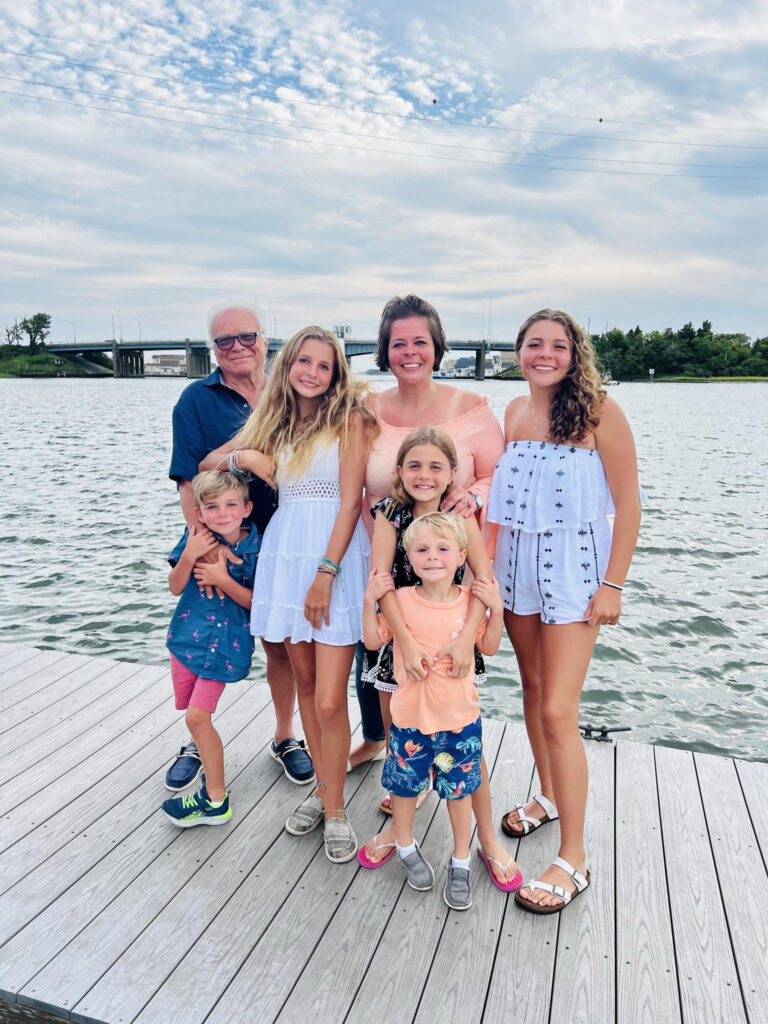
Réka grew up in a family where scouting meant everything. She was born into it, but she also saw the negative side. Once, when she went to a two-week leadership training camp, I went with her and worked in the kitchen the whole time. Even though I had stopped scouting at 19 or 20, I wanted to help. My father was deeply involved in scouting, even in his old age. For example, he renovated the Garfield Scout House. And when they rebuilt the buildings at Sík Sándor Scout Park in New York, he single-handedly wired all the electricity into every building—at 74 years old. Scouting is important and valuable, especially for young children. But what it has become today is too much for me. I don’t like cliques, which I experienced too much in scouting. I’m a freer person than that, so while my father helped the scouts, I preferred to help the church instead.
Tell us about your 50 years at St. Stephen’s, led by five different pastors.
The first priest I played for was Father Antal Dunai. But back then, I wasn’t deeply involved in church life—I was still a kid, and adults didn’t take kids’ opinions seriously. But my father and I worked a lot for the church. At that time, they were building a new section of the Hungarian school. They needed money, so we came up with a plan: we collected newspapers and recycled them. We stored them, and once a month, we brought everything to the church parking lot. Back then, they paid for recycled paper, so this became our monthly fundraising project. I really can’t say too much about Father Dunai, except that he was a good priest who constantly criticized my organ playing. (laughs)
When he died, Father Béla Török came. There was a core group of people who always worked for the church, like László Károlyi. He was actually my first father-in-law, but even after my divorce, we remained friends and kept working together. He would always ask me: ‘Ferike, can you handle this?’ That’s how I eventually took over many of the responsibilities and later even the secular council’s work. During that time, we organized County Balls every year. János Németh drew the county maps—you can still see them on the wall today. We ran them for several years, but when the organizers burned out, I took over. We also had museum balls, organized by Emese and László Kerkay, Kálmán Magyar, and Miklós Lipóczi. They also asked me to help. These events were like a training ground for me. When they eventually got tired of it, I took over to keep the community together. Once, we even organized a Renaissance Ball, where everyone dressed in period costumes. It was so successful that we kept it going for five more years. Since the building also housed a school, we had to set everything up on weekends and restore everything by Monday. It was a lot of work, but it brought people together—they felt like they belonged to something.
‘My goal was always to keep people together—because that’s what I saw from those before me’
But before that, still under Father Török, in 1987, the school hall burned down. The insurance paid, but the money ran out fast—and the roof wasn’t built as originally planned. Since I was a contractor, I offered to finish the project with volunteer help. Many people helped out. About two years later, when it was done, I told the council: ‘We need more money. Let’s organize a fundraising dinner.’ No one volunteered. I got angry and said: ‘Fine! Then I’ll organize the ball too.’ My mother cooked, my father managed the event, and I helped decorate. When we finally finished the hall, we opened it for free so everyone could see our work. In the evening, we had a ticketed dinner. I called every volunteer on stage. That night, we raised $13,000 and only spent $4,000. Everyone got excited, and for the next couple of months, we kept organizing events.
After Father Török came Father István Mustos, who was very enthusiastic about everything, always encouraging us to do it. By then, I was taken seriously, we worked together, we really did a lot of things together with him, then under Father László Vas and, of course, under Father Laci Balogh. The balls stopped when the church community divided under Father Vas László; even the secular council had to be reorganized. After that, we stopped organizing the big balls. The situation has since stabilized, but events like those are no longer possible.
When you decided to move to Alabama, you also had to leave this ‘big family’ behind. Was it a hard decision?
All five of our children were baptized here. After each baptism, we had a celebration—but not just for family and a few close friends, we invited the entire church. Since I also played the organ for the English Mass, I made sure to invite them too—because I believe both communities should be cared for equally, regardless of their size. At one point, even my own family said: ‘Are you crazy? Why are you doing this?’ I replied, ‘Because I want to; this is my big family.’ My goal was always to keep people together—because that’s what I saw from those before me, people like my mother and father, Laci Kerkay, Miklós Lipóczi, or Frici Kormann. Two weeks before he passed away, Frici came up to me and said: ‘Feri, keep doing this. Don’t stop.’
As regards the move, I prayed a lot and had many conversations with God. I told him I hope I fulfilled my mission well, and He should tell me: should I stay, or should I go? I finally realized that I’ve done my part; now, it’s time to focus on my own family. My heart was very heavy; it was so hard to leave everything behind. I loved doing it all. I loved playing the organ. They used to say that my playing carried a spirit that not everyone could convey. And when I can, I come back and help, just like I’m doing now. What I miss most is the people, not so much the church building itself. I keep in touch, I follow the online Masses, and if I have something to say, I call the priest. But what I miss the most is the music. Before coming to Passaic, I was invited to play at an American church. We’ll see. If what I can offer is valuable to them, then I’ll do it.
After 50 years, you’re now seeing the church from the outside. What do you think about it now? How should the community ensure its future?
I was so happy to see everyone again, especially István Horváth and his family, and of course, the priest. I looked forward to Sunday Mass—to that moment of reflection. But something was missing. I was genuinely happy to be there, but my emotions quickly turned into a rollercoaster. The people were more or less the same, but something had changed. I looked around, and I didn’t see the familiar expressions and gestures I was used to. It felt like I was looking at spectators, people who weren’t allowing themselves to truly experience the moment. The question is: why? Where did my big family go? For the last four weeks, I’ve been thinking about this, trying to find an answer. And I realized that the answer lies in the meaning of family.
I believe that in a true family, there are no favorites. Everyone is accepted exactly as they are. A real family knows how to respect differences, how to lift each other up, and how to teach love through example. As a parish community, we are also a family. Love has a simple definition: Giving of ourselves. The more I give, the more I learn to love. So the key is to give from the heart. Change can be a good thing, but only when it is done with balance. And we must respect the past in order to build the future.
The future of this parish depends on every single person who participates in it and calls it home. The church will thrive if we learn to serve it—rather than expecting it to serve us. We must all understand this clearly. I truly believe that God can do miracles with this church community—if we learn to listen to Him. After all, He knows best what this family truly needs. Love one another!
Read more Diaspora interviews:

